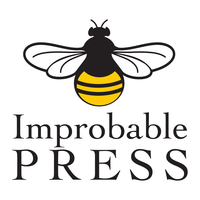
Closed.
Closed.
Closed to submissions.
If it seems to you that most small presses are closed to book submissions you're not wrong. A random check just now showed me 60-70% of presses are closed – usually including Improbable Press.
There's a good reason for this: not enough staff to read submissions, and edit, proof, lay out, illustrate, and promote the books we already have in progress.
So.
What's a writer to do when there seems no way in?
First, Know That There Is a Way In
I can't speak for every press, obviously, but I can speak for a few, including this one, so I can say that even if a press is closed, closed, closed to submissions, in my personal experience they very well may not be closed to two things:
* recommendations from another press/publisher/editor
* queries from their own short story writers
Recommendations From Another Press
I was sent a book the last time we were open to submissions and while it wasn't quiiiite what we wanted, it was good. And so I reached out to another small press with which I'm familiar, one that was closed to submissions but I know what they publish, and I said, "YO YO! Lookit this, want to publish it?"
(Like that, I said it just like that.)
Their shouty response was, "We love this!" and that book is publishing early next year with that press.
So, if a press has rejected your book with kind words? Politely acknowledge their time, and then ask them for suggestions. "Do you know another press that might be interested in a book like this?"
More
Your writing career: How to make sure it's a real short trip
Know Your Publisher: Independent? Subsidy? What's the Diff?
The Ultimate Guide to Getting Published
They may not. And it's not their job to know who wants what, when. But they might have an idea and it can't hurt to ask. So ask. You might have a book coming out next year, too.
Write Short Stories, Submit to Anthologies
The other route to submitting a book to a publisher that's closed to submissions is to submit stories to their anthologies.
If your story is accepted (sorry, this doesn't apply if your story isn't accepted), you know that the publisher likes your kind of work, so politely ask them if they'd like to see your novel or your novel's synopsis.
They may say no. They may be full out editing, proofing, laying out, and promoting the books they already have.
However.
They may also be curious, because perhaps yours was their absolute favorite story in the antho you're in, maybe they'd really like to see what you do on a bigger scale. Maybe they just put a book to bed and you caught them on an easy day.
The point is, you're a known quantity now, they've seen how you write and and and more importantly, how you take edits, how you help promote your own work, how courteous you are.
(Look, courtesy is almost as important as stellar writing. Like…it's right up there. It's huge.)
These Aren't Guarantees…But They Help
Clearly neither of these things assure your work will be published, but they can help get it in front of other eyes.
We have more than once published the books of writers who were recommended to us, or who we first knew through their short stories, so these are powerful routes to publication.
So is courtesy. I'm never letting up on that because some writers express their anxiety about the whole publication process with rudeness, and you simply have to look at getting published like a job interview. Bring your best you to that introductory email. Be kind.
Editors remember that.
YO YO!
